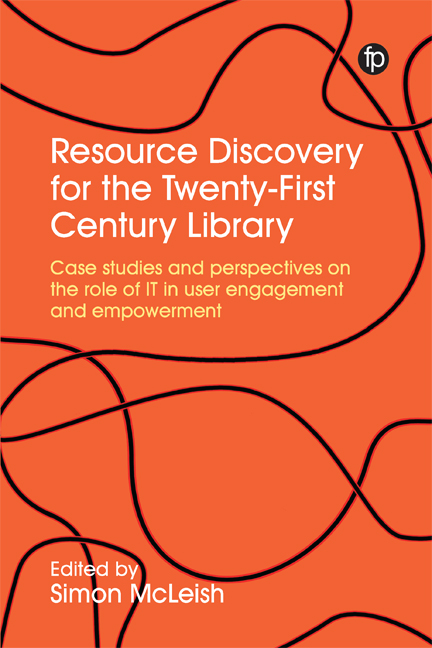Book contents
- Frontmatter
- Contents
- Figures and Tables
- Contributors
- Foreword: Library Discovery Directions
- 1 Introduction: Technology and Resource Discovery
- 2 Flipping the Catalogue: Taking Resource Discovery to the Next Level
- 3 Breaking the Record: Liberating Data into Knowledge at the National Library Board of Singapore
- 4 Case Study: Clearing Library Discovery-to-Access Pathways for IEEE Content
- 5 Case Study: Putting Discovery at the Heart of the Library Experience
- 6 Investigating Resource Discovery Needs at the University of Oxford
- 7 ‘Why Can’t you Just Use Google?’
- 8 Exposing Collections and Resources Effectively
- 9 Open Source Discovery using Blacklight at the University of Hull
- 10 A World of Curated Knowledge: Leveraging the Wider Semantic Web to Enhance Library Discovery
- 11 Cultural Discovery: Trends and Futures
- 12 Discovering the Future
- Editorial Afterword
- Index
5 - Case Study: Putting Discovery at the Heart of the Library Experience
Published online by Cambridge University Press: 23 July 2020
- Frontmatter
- Contents
- Figures and Tables
- Contributors
- Foreword: Library Discovery Directions
- 1 Introduction: Technology and Resource Discovery
- 2 Flipping the Catalogue: Taking Resource Discovery to the Next Level
- 3 Breaking the Record: Liberating Data into Knowledge at the National Library Board of Singapore
- 4 Case Study: Clearing Library Discovery-to-Access Pathways for IEEE Content
- 5 Case Study: Putting Discovery at the Heart of the Library Experience
- 6 Investigating Resource Discovery Needs at the University of Oxford
- 7 ‘Why Can’t you Just Use Google?’
- 8 Exposing Collections and Resources Effectively
- 9 Open Source Discovery using Blacklight at the University of Hull
- 10 A World of Curated Knowledge: Leveraging the Wider Semantic Web to Enhance Library Discovery
- 11 Cultural Discovery: Trends and Futures
- 12 Discovering the Future
- Editorial Afterword
- Index
Summary
Introduction
Ensuring the best possible end-user experience and optimal collection usage lies at the foundation of the library's mission to support research and provide access to information. A library's success stands or falls by the ease with which its users can swiftly find the information they need. Today's users expect a discovery solution that enables them to search and retrieve rapidly the most relevant information from any device, anywhere and anytime.
This chapter explores what today's users expect in a discovery solution. The chapter looks at the emergence of discovery, the fundamental technologies and approaches that underlie a modern discovery solution, and what we may expect as discovery further evolves to meet emerging user needs.
Background
With the rise of the internet, the online public access catalogue (OPAC) emerged: an online interface for end-users to find items in a library's catalogue. The OPAC was tightly coupled with the integrated library system and functioned in effect as a portal. Library users searched for items in the OPAC and performed a variety of functions, such as placing holds, renewing items and paying fines. Additionally, the library services platform arose, seeking to enable the management of print and electronic
materials in a single environment. Building on these evolving notions of library service, around the year 2010 a new model for library discovery appeared: discovery.
Google had set the standard for ‘search’: a single search box providing immediate access to all resources became the norm. In the library space, discovery became the means to provide access to all of the library's resources, thereby defining the library end-user's experience, and becoming the essence of library success. As well as providing access to resources from a single search box, discovery solved the ‘where to start’ challenges posed by the proliferation of databases, e-books and e-journal platforms. Discovery depends on several factors:
the ability to customise the service to meet institutional and user needs
the inclusion of all content types from many content providers
the technological approach to search and relevance ranking
the interoperability of the solution with third-party applications such as the library services platform (or its previous iteration, the integrated library system).
- Type
- Chapter
- Information
- Resource Discovery for the Twenty-First Century Library , pp. 63 - 76Publisher: FacetPrint publication year: 2020



